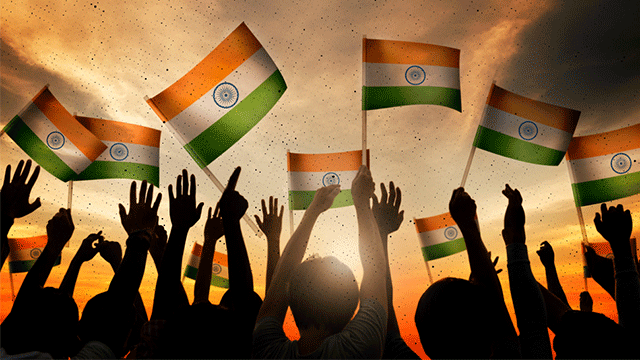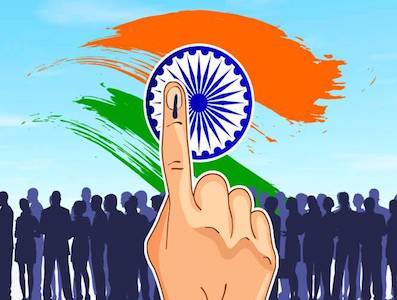Democracy in India The World’s Largest Election Machine
Introduction
India, often hailed as the world’s largest democracy, stands as a testament to the resilience of democratic values despite its vast diversity and complex socio-political landscape. With over 900 million eligible voters, India’s elections are a colossal exercise in governance, logistics, and citizen participation. The democratic system in India has evolved significantly since its independence in 1947, overcoming numerous challenges while continuing to uphold the principles of free and fair elections.

The Evolution of Indian Democracy
India adopted a democratic system after gaining independence from British colonial rule in 1947. The Constitution of India, enacted in 1950, established the nation as a sovereign, socialist, secular, and democratic republic. The first general elections were held in 1951-52, marking the beginning of an electoral process that remains robust to this day.
Over the decades, India’s democracy has undergone significant transformations. From the early dominance of the Indian National Congress (INC) to the rise of coalition governments and the emergence of regional parties, the political landscape has continuously evolved. Landmark events such as the Emergency (1975-77), economic liberalization (1991), and the rise of digital election campaigns have shaped the democratic structure of the nation.
The Election Commission of India (ECI)
The Election Commission of India (ECI) is the autonomous body responsible for conducting free and fair elections. Established under Article 324 of the Indian Constitution, the ECI has played a crucial role in maintaining the integrity of electoral processes. The Commission oversees Lok Sabha (parliamentary), Rajya Sabha (upper house), state assembly, and local body elections.
The ECI ensures transparency through measures such as:
- Electronic Voting Machines (EVMs) and Voter Verified Paper Audit Trail (VVPAT) systems
- Model Code of Conduct (MCC) to regulate political campaigns
- Strict monitoring of election expenses and voter inducements
- Awareness campaigns to increase voter participation
The Scale and Complexity of Indian Elections
Indian elections are unparalleled in their scale. The 2019 general elections, for instance, involved:
- Over 900 million registered voters
- Nearly 1 million polling stations across urban and remote locations
- Over 10 million election officials and security personnel deployed
- Multiple phases spanning several weeks to ensure smooth voting
Organizing elections in a country with diverse linguistic, cultural, and geographical landscapes poses logistical challenges. Remote areas, such as the Himalayas and tribal regions, require innovative methods to ensure every eligible citizen can vote. Special provisions are made for differently-abled voters, the elderly, and those serving in the armed forces.
Major Political Parties and Electoral Trends
India follows a multi-party system with national and regional political parties playing crucial roles. Some of the key political parties include:
- Bharatiya Janata Party (BJP) – A right-wing party advocating nationalism and economic development.
- Indian National Congress (INC) – A center-left party with a legacy of leading India’s independence movement.
- Regional Parties – Influence state politics significantly, such as the Trinamool Congress (TMC) in West Bengal, the Dravida Munnetra Kazhagam (DMK) in Tamil Nadu, and the Aam Aadmi Party (AAP) in Delhi.
Electoral trends in India have seen shifting voter allegiances, the rise of regional parties, coalition governments, and a growing emphasis on social media campaigns. The increasing role of youth and women voters is reshaping electoral outcomes.

Challenges Facing Indian Democracy
Despite its success, Indian democracy faces several challenges:
- Money and Muscle Power – The influence of money and criminal elements in politics remains a concern.
- Voter Apathy and Misinformation – Fake news, propaganda, and declining voter turnout in urban areas pose threats.
- Communal and Caste-based Politics – Electoral campaigns often exploit religious and caste identities for votes.
- Electoral Reforms – There is a need for greater transparency in political funding and stricter regulation of social media influence.
- Violence and Security Threats – Election-related violence in certain regions disrupts the democratic process.
The Future of Democracy in India
Despite these challenges, democracy in India remains strong due to its robust institutions, an active judiciary, and a vigilant civil society. Technological advancements, including blockchain-based voting and digital election monitoring, could further enhance electoral transparency. Reforms aimed at curbing corruption, increasing youth participation, and strengthening electoral laws will shape the future of India’s democracy.
As the world’s largest democracy, India serves as a model of electoral resilience. While challenges persist, the commitment of its people to democratic ideals ensures that elections continue to reflect the voice of its citizens. The journey ahead involves embracing reforms, fostering political awareness, and safeguarding democratic principles for generations to come.


